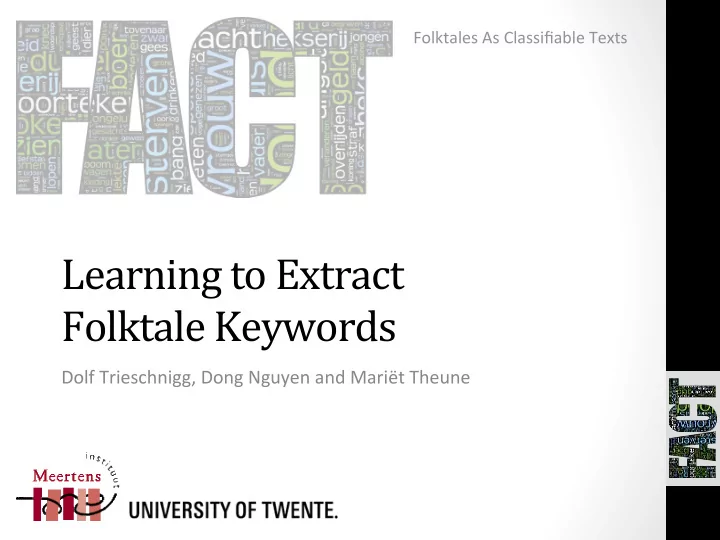

Folktales ¡As ¡Classifiable ¡Texts ¡ Learning ¡to ¡Extract ¡ Folktale ¡Keywords ¡ Dolf ¡Trieschnigg, ¡Dong ¡Nguyen ¡and ¡Mariët ¡Theune ¡
Once ¡upon ¡a ¡time… ¡ • There ¡was ¡a ¡research ¡ins@tute ¡in ¡Amsterdam ¡that ¡wanted ¡to ¡ collect ¡folktales… ¡
• Not ¡only ¡to ¡study ¡Dutch ¡folklore, ¡but ¡also ¡to ¡document ¡part ¡of ¡ the ¡Dutch ¡oral ¡tradi@on… ¡
• They ¡asked ¡people ¡from ¡all ¡over ¡the ¡Netherlands ¡to ¡collect ¡ stories ¡in ¡their ¡surroundings ¡
• How ¡did ¡they ¡do ¡that ¡in ¡a ¡@me ¡without ¡tablets, ¡smartphones ¡ and ¡laptops? ¡
• They ¡got ¡on ¡their ¡bike ¡and ¡used ¡pencil ¡and ¡paper. ¡Later ¡they ¡ even ¡used ¡tape ¡recorders… ¡ + ¡
• They ¡stored ¡these ¡stories ¡in ¡large ¡archives ¡to ¡collect ¡dust ¡and ¡ to ¡be ¡used ¡by ¡researchers ¡ + ¡ = ¡
• In ¡1994 ¡they ¡started ¡inser@ng ¡the ¡archives ¡in ¡a ¡so-‑called ¡ database: ¡The ¡Dutch ¡Folktale ¡Database ¡was ¡born… ¡
• They ¡employed ¡students ¡to ¡digi@ze ¡these ¡paper ¡stories, ¡add ¡ metadata, ¡and ¡store ¡them ¡in ¡the ¡database ¡
• In ¡2004 ¡the ¡database ¡became ¡available ¡online! ¡
• So ¡the ¡Meertens ¡Ins@tute ¡lived ¡happily ¡ever ¡aTer? ¡ ¡
• No, ¡because ¡s@ll ¡too ¡many ¡stories ¡await ¡archiving; ¡adding ¡ metadata ¡takes ¡too ¡much ¡@me. ¡
• So ¡they ¡decided ¡to ¡study ¡automa@c ¡keyword ¡extrac@on. ¡ slipper ¡ stepmother ¡ stepsisters ¡ prince ¡ ball ¡ chores ¡ pumpkin ¡ … ¡
Overview ¡ • About ¡the ¡collec@on: ¡The ¡Dutch ¡Folktale ¡Database ¡ ¡ • Characteris-cs ¡of ¡keywords ¡in ¡the ¡DFDB ¡ • Sta@s@cs ¡ • How ¡do ¡the ¡keywords ¡relate ¡to ¡the ¡story ¡text? ¡ • Do ¡annotators ¡agree? ¡ • Automa-c ¡extrac-on ¡of ¡keywords ¡ • Setup, ¡systems ¡& ¡results ¡ • Which ¡features ¡to ¡use? ¡ • Conclusion ¡
The ¡Dutch ¡Folktale ¡Database ¡ • Maintained ¡by ¡the ¡Meertens ¡Ins@tute ¡since ¡1994 ¡ • > ¡40,000 ¡Dutch ¡folktales, ¡collected ¡since ¡the ¡19th ¡century ¡ • Subgenres ¡ • Fairy ¡tales, ¡legends, ¡urban ¡legends ¡ jokes, ¡riddles, ¡personal ¡narra@ves ¡ • Languages ¡ • Dutch, ¡Frisian, ¡Old ¡Dutch, ¡Middle ¡Dutch ¡ ¡ and ¡many ¡Dutch ¡dialects ¡ • Other ¡metadata ¡ • Summary, ¡ keywords , ¡story ¡type, ¡mo@fs ¡ proper ¡names, ¡storyteller, ¡loca@on ¡etc. ¡ • Online ¡since ¡2004: ¡www.verhalenbank.nl ¡
Keywords ¡in ¡the ¡DFDB ¡(1/2) ¡
Keywords ¡in ¡the ¡DFDB ¡(2/2) ¡ • Keyword ¡assignment ¡ • Manual ¡uncontrolled ¡vocabulary ¡indexing ¡ • Vaguely ¡defined ¡indexing ¡task ¡ • Carried ¡out ¡by ¡many ¡different ¡annotators ¡ • Sta@s@cs ¡(42k ¡docs, ¡17k ¡Dutch) ¡ • 15 ¡assigned ¡keywords ¡on ¡average, ¡median ¡10 ¡ • Mostly ¡single ¡words ¡(90%) ¡ • 43k ¡unique ¡keywords ¡ • 65% ¡of ¡keywords ¡appears ¡literally ¡in ¡(Dutch) ¡text ¡
How ¡do ¡the ¡keywords ¡ relate ¡to ¡the ¡story ¡text? ¡ • Manual ¡classifica@on ¡of ¡50 ¡docs, ¡989 ¡keywords ¡ • Classes ¡frac@on ¡ • Literal ¡68% ¡ • Almost ¡literal ¡12% ¡ • Synonym ¡5% ¡ • Hypernym ¡2% ¡ • Typing ¡error ¡ ¡<1% ¡ • Other ¡(more ¡abstract, ¡etc.) ¡13% ¡ • è ¡80% ¡can ¡be ¡(almost) ¡literally ¡linked ¡to ¡the ¡text ¡
Do ¡annotators ¡agree? ¡ • Setup ¡ • 10 ¡annotators ¡(2 ¡experienced), ¡5 ¡stories ¡each ¡ ¡ • Each ¡story ¡annotated ¡by ¡2 ¡annotators ¡ • Judge ¡all ¡story ¡words: ¡ 1) ¡non-‑relevant; ¡2) ¡relevant; ¡3) ¡highly ¡relevant ¡ • Determine ¡inter-‑annotator ¡agreement ¡ • Results: ¡ • Substan@al ¡agreement ¡on ¡relevant ¡keywords ¡(κ: ¡0.62), ¡ only ¡moderate ¡agreement ¡on ¡highly ¡relevant ¡keywords ¡(κ: ¡0.48) ¡ • Reasons ¡for ¡disagreement ¡ 1) ¡verbs ¡and ¡adjec@ves? ¡2) ¡overlooked ¡ 3) ¡choice ¡rather ¡than ¡both ¡4) ¡lack ¡of ¡instruc@ons ¡ • Experienced ¡annotators ¡indicate ¡more ¡relevant ¡keyword ¡ and ¡show ¡higher ¡average ¡agreement ¡ ¡
Automatic ¡extraction ¡ • Setup ¡ • Ranking ¡task: ¡rank ¡most ¡relevant ¡words ¡from ¡text ¡first ¡ • Evalua@on: ¡reproduce ¡manual ¡keyword ¡list ¡(IR ¡metrics) ¡ • 17,000 ¡documents, ¡10-‑fold ¡cross-‑valida@on ¡ • Systems ¡ • Baseline ¡1: ¡TF-‑IDF ¡(in ¡training ¡collec@on) ¡ • Baseline ¡2: ¡TF-‑IDF-‑T ¡(prefer ¡seen ¡keywords) ¡ • Learning ¡to ¡rank: ¡linear ¡ranking ¡SVM ¡ • Features ¡from ¡word, ¡document ¡and ¡collec@on ¡context ¡ • Results ¡
Which ¡features ¡to ¡use? ¡ All ¡features ¡ Minimum ¡set ¡ • Word ¡context ¡ Part ¡of ¡speech ¡ • Dispersion ¡ • Starts ¡uppercase ¡ • Tf.idf ¡ • Contains ¡space ¡ • Assignment ¡ra@o ¡ • Is ¡number ¡ • ¡ Contains ¡lemers ¡ • All ¡capital ¡lemers ¡ • Single ¡lemer ¡ • Contains ¡punctua@on ¡ • Part ¡of ¡speech ¡ • • Document ¡context ¡ Tf ¡ • First ¡offset ¡ • First ¡sentence ¡offset ¡ • Sentence ¡importance ¡(SumBasic) ¡ • Dispersion ¡(Gries, ¡2008) ¡ • • Collec@on ¡context ¡ Idf ¡ • Tf.idf ¡ • Is ¡training ¡keyword ¡ • Assignment ¡ra@o ¡ •
Conclusion ¡ ¡ • For ¡the ¡Dutch ¡Folktale ¡Database ¡ • Uncontrolled ¡indexing ¡is ¡necessary ¡ • Many ¡single ¡word ¡keywords ¡which ¡appear ¡(almost) ¡literally ¡in ¡text ¡ • Moderate ¡to ¡substan@al ¡agreement ¡between ¡annotators ¡ • Learning ¡to ¡rank ¡can ¡be ¡used ¡for ¡sugges@ng ¡keywords ¡ • 3 ¡out ¡of ¡top ¡5 ¡relevant ¡ • Important ¡features: ¡ 1) ¡assignment ¡ra@o, ¡2) ¡q.idf, ¡3) ¡part-‑of-‑speech ¡and ¡4) ¡dispersion ¡ • Future ¡work ¡ • Deal ¡with ¡mul@lingual ¡content ¡ • Suggest ¡abstract ¡keywords ¡
Questions? ¡ • D.Trieschnigg@utwente.nl ¡
Recommend
More recommend